Vegan Bodybuilding: Pumping Up With Plants
When people hear the phrase “vegan bodybuilder,” they raise their eyes in question.
“Ummm…is that even possible?”
A certain image enters into the minds of those outside of the vegan community that paints non-meat-eaters as skinny and unhealthy. And that there’s no way people can get big and strong just eating plants.
But we’re here to say: it’s just not true! Bodybuilding is becoming increasingly popular, and for many reasons. Health, self-confidence, … and sometimes just a will to prove others wrong.
We discuss the optimal and most cost-effective ways to transition and thrive on plant power.
Transitioning To A Vegan Diet
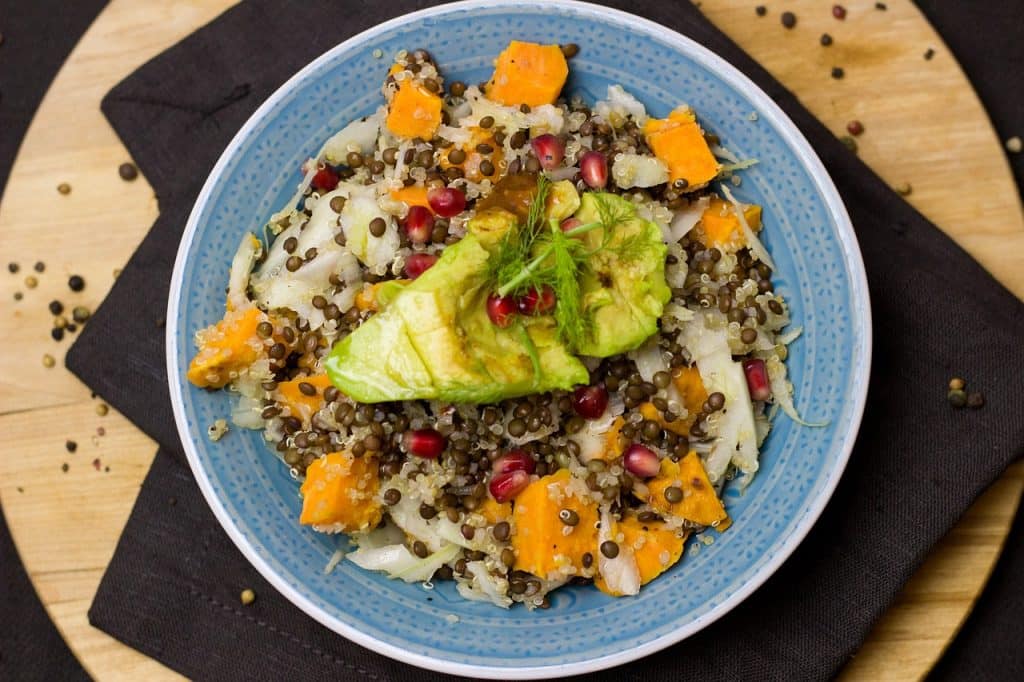
As mentioned above, we’re here to assure you: it is possible to survive and THRIVE as a vegan bodybuilder!
If you’re new to veganism, it could become overwhelming to start both of these massive lifestyle changes at the same time. It’s recommended that you become comfortable with the plant-based diet before attempting to build your body.
Here are three steps to follow when starting on the vegan path:
-
Transition slowly. Trying to cut everything out all at once often proves to be too tough of a challenge to new vegans, and they end up returning to their original diet without giving it a fair chance. Try incorporating a “Meatless Monday” or day of the week where you abstain from meat, then when you’re ready, ease more and more into the vegan diet.
-
Educate yourself. Learn about the ethical, health, and environmental benefits of veganism to stay motivated and inspired for the long run.
-
Expect some resistance. Expect some social pressure and resistance, especially if you have an omnivorous friend group.Sometimes, change doesn’t come easy. Try to have patience with those who don’t understand right away. Listen to their concerns and make sure you have your bases covered. Often, they’re just concerned for your health and want the best for you!Establish your sense of community by joining and being active in an online vegan forum. This will help you learn and grow as a vegan while sharing your experience with others.
A must read:
How to Go Vegan: The Ultimate Guide
Walk step-by-step through the transitioning process. You’ll also learn how to stay motivated and discover many delicious recipes to get you started!
First Thing’s First: Let’s Talk Protein
How hard is it to get protein on a vegan diet vs an omnivorous diet?
While meat does provide a substantial amount of protein (and is the main source of protein for most people), protein can just as easily be found while on a plant-based diet.
Here are some of our favorite high-protein vegan foods and the amount of protein contained in one cup (unless otherwise specified):
-
Kidney beans (43g)
-
Almonds (30g)
-
Tofu (8g in ½ cup)
-
Chia seeds (17g in 100g)
-
Peanut butter (8g in 2 tbsp)
-
Quinoa (8g)
-
Kale (4g in 100g)
-
Tempeh (31g)
-
Spirulina (4g in 1 tbsp)
All About Vitamins
Iron and B12
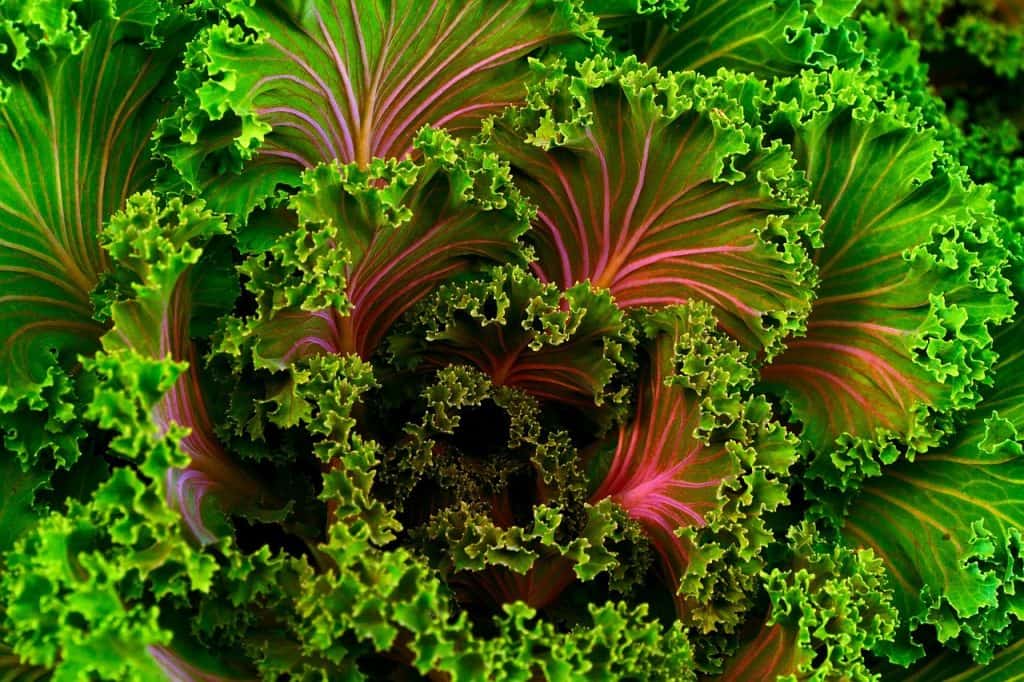
The iron myth
Iron is an element that’s essential for the body’s blood production. It carries oxygen through the blood and has a vital role in converting blood sugar into energy.
Without enough iron, energy levels become low, resulting in fatigue.
Here’s a quick list of plant-based iron sources:
-
Legumes: lentils, lima beans, and soybeans
-
Grains: quinoa, brown rice, and oatmeal
-
Nuts and seeds: pine nuts, pumpkin seeds, pistachios, cashews
-
Vegetables: chard, collard greens, and spinach
And did you know? Plant-based sources of iron are actually better than iron from meat.
And here’s the reason: iron from meat will be absorbed into your body whether you need it or not, while excess plant-based iron will be flushed out. But iron overload can lead to medical problems including reduced hormone production, erectile dysfunction, and abnormal heartbeat.
The importance of B12
Vitamin B12 is one that’s simply not plentiful enough in the plant-based diet and is one for which you will need a supplement, especially as a bodybuilder.
Here are a few frequently asked questions about B12 that will help you gain a better understanding of why it’s so important.
Vitamin B12: Frequently Asked Questions
Do I really need it?
Since B12 isn’t plentiful enough in the plant-based diet, it’s one for which you will need a supplement, especially as a bodybuilder.
Why is it important that I have B12?
B12 has very important roles in the body, including red blood cell regulation, energy production, stabilizing neurological issues, and controlling gastrointestinal processes.
How is B12 specifically benefit my bodybuilding?
The B vitamins give the body energy. B12 specifically assists in metabolizing protein and fat and also moves red blood cells around the body efficiently (excellent for intense training as a bodybuilder).
An added benefit is that it’s shown to enhance cognitive function. Here’s a quality B12 supplement that we recommend:Jarrow Formulas Methyl B12 Lozenges
How can I use B12?
B12 supplements are commonly found in the form of a pill, a capsule, or a spray that you apply under your tongue.
Vitamin D and Amino Acids

Do I need a Vitamin D supplement?
Contrary to popular assumption, we don’t get Vitamin D from the sun. It’s made in our own skin, and getting proper sun exposure helps activate the process.
But it is very important we get proper exposure to the sun because Vitamin D deficiency can result in many serious health issues, many of which are especially detrimental as a bodybuilder. Here are some of the issue that Vitamin D deficiency can cause:
-
Osteoporosis
-
Inefficient absorption of magnesium, calcium, and zinc
-
Lower immune system function
-
Fatigue and tiredness
However, if you get enough sun exposure (the common recommendation is 20 minutes per day), it’s unlikely you’ll need to supplement with Vitamin D.
Because Vitamin D is not naturally present in many foods, it’s necessary you either get that sun exposure or alternatively, you could begin taking a Vitamin D supplement.
Amino Acids
Put simply, amino acids are the building blocks of protein. There are nine essential amino acids (meaning they can’t be made by the body and must come from food). They carry out several extremely important functions within the body, such as the proper distribution of nutrients, repair and healing of tissue, and the correct structuring of cells.
And their importance is on the rise. This is due to several factors, including smoking, drinking, hormonal imbalances, and even pollution.
It’s shown that these factors can inhibit the body from efficiently using the nutrients from the food we consume. This is why it’s so important to pay close attention to what we’re eating and the activities we choose.
But how does this affect us as vegans? Can we get a complete amino acid profile from eating plant foods? Absolutely.
And there’s a simple solution: eat a wide variety of plant-based whole foods.
When you combine plant foods to gain an assortment of nutrients, it’s likely you’ll meet the requirements for most all of the essential amino acids.
For example, rice and beans are two foods that are lacking in all the essential amino acids by themselves. But when you combine them, you create a complete protein containing all the essential amino acids!
Soy And its Common Myth
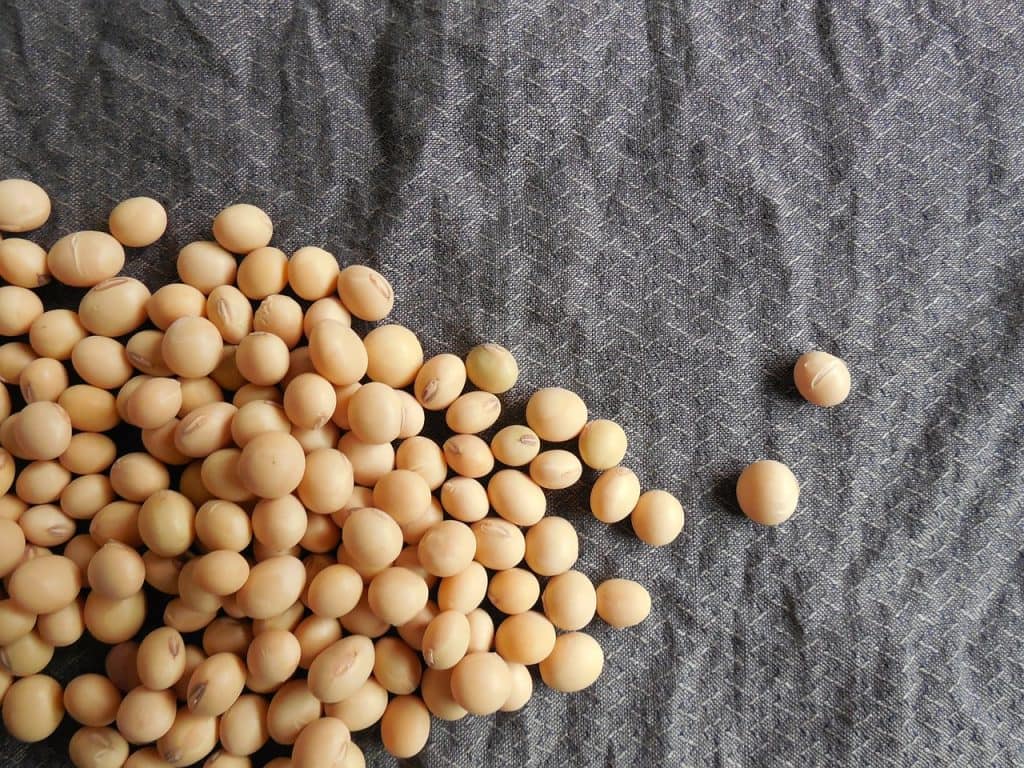
There’s a common myth floating around about soy, and that’s that it causes gynecomastia (or, “man boobs” – extra fat in the chest of men).
And that myth is simply not true. In fact, gynecomastia naturally affects over 30% of men at some point in their lives.
Mic. the Vegan’s comprehensive video (above) points to an enlightening quote on the subject by Mark Messina, Ph.D., School of Public Health at Loma Linda University:
“…the clinical evidence overwhelmingly indicates that there is essentially no basis for concern. Men can feel confident that making soy a part of their diet will not compromise their virility or reproductive health.”
This study on the American Association for Cancer Research website concluded that consuming phytoestrogen did not change baseline blood levels of hormones in men who were asked to drink 1.7 cups of soymilk per day.Their testosterone levels stayed the same, while it actually lowered their estrogen.
Here’s a crazy-sounding fact: dairy products pose more of a concern than soy products. The estrogen found in cow milk has a greater risk of leading to prostate cancer in men and breast cancer in women.
All About Carbohydrates
The carbohydrate myth
Carbohydrates, or carbs, have a historically bad rap.
Contrary to this belief, carbs are actually an essential nutrient that plays a very important role in the diet. In fact, they’re the body’s primary energy source, as they are the sugars, starches, and fibers found in the food we eat.
Carbs break down into glucose and provide the fuel necessary for our brain and nervous system. They also greatly help our organs and muscles during exercise.
However, while carbs are important to our diet, it’s not a good practice to load up on them just to satiate ourselves or meet our daily calorie goal. This Harvard study from 2014 shows how consuming excess sugar can lead to weight gain, heart disease, and Type 2 Diabetes.
Here’s some key carb knowledge to keep in mind when meal planning.
Simple carbohydrates
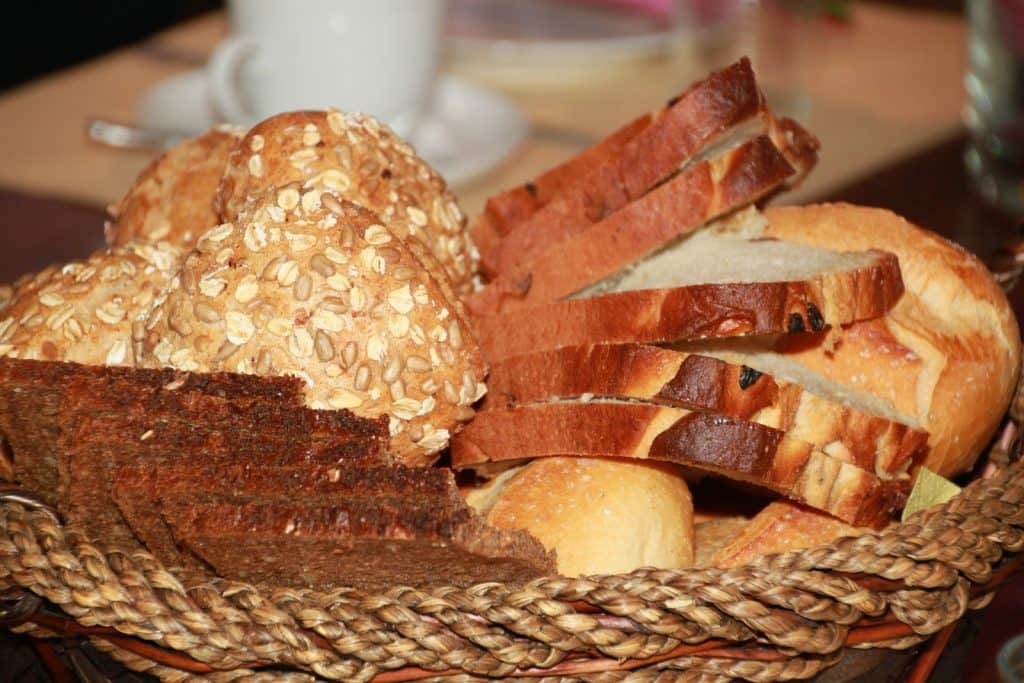
Simple carbohydrates are those carbs that are broken down and absorbed quickly by the body for energy.
Widely known as “bad” carbs because of how they’re used by the body, simple carbohydrates are usually higher in sugar and lower in fiber. Because the body processes them so quickly, they can lead to a spike in blood sugar levels (the concentration of sugar in the blood), causing us to feel jittery, nervous, and hyperactive.
Here are some examples of simple carbohydrates:
-
White bread, pasta, and rice
-
Artificial flavorings
-
White sugar
-
Candy
-
Soda
You’ll notice that the foods listed above consist of sugar, candies, soda, and other foods generally considered “unhealthy.” When possible, limit your intake of these simple carbs for better alternatives.
Complex carbohydrates
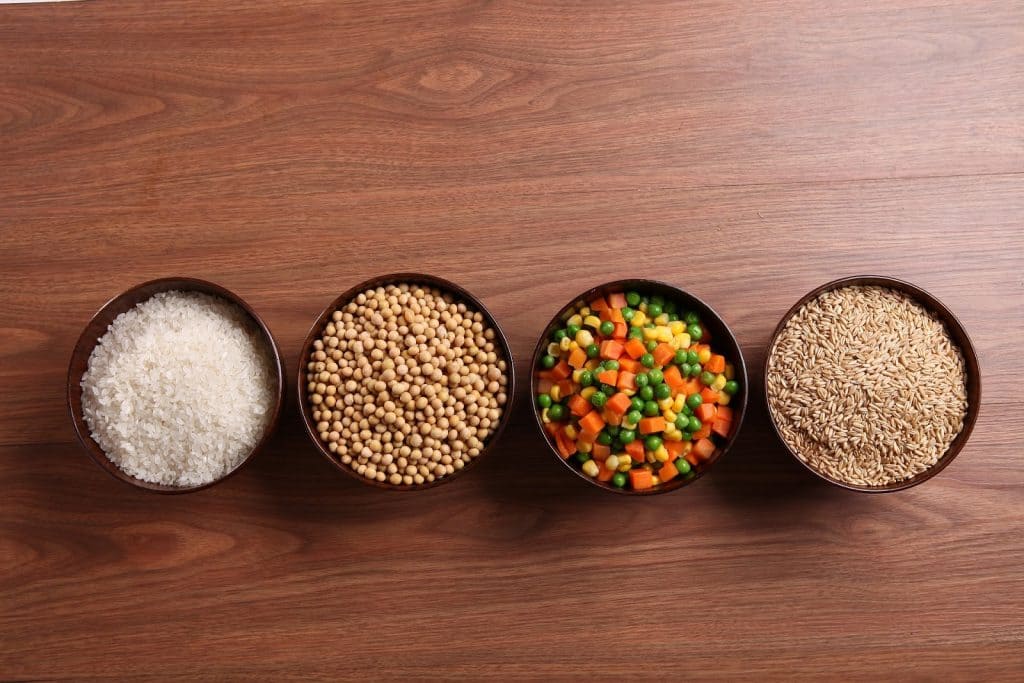
Those carbs known as complex carbohydrates absorb into the body slower, due to containing longer chains of sugar molecules.
Since complex carbs are slow-released and take longer for the body to break down, they provide us with sustained energy for a longer period of time (and without the “crash”).
Some examples of complex carbohydrates include:
-
100% whole grains
-
Beans
-
Legumes
-
Vegetables
-
Fruits
-
Brown rice
-
Sweet potatoes
You’ll notice from the list above that these foods are the more healthful alternative. These will give your body better long-term results, both in terms of energy and overall health.
But what does this mean for me?
A brief introduction to the Glycemic Index
As mentioned in the above section, carbs are broken down and converted into energy for the body. And the body can have very different reactions when processing certain types of foods.
In other words, not all carbs are equal.
The Glycemic Index, or “GI,” is an index of foods and how they cause the body to react. This globally-recognized index ranks food from 1-100 according to how fast that food raises the body’s blood sugar level.
The higher the number, the faster the food raises the body’s blood sugar level.
How do simple and complex carbs factor in? The simple carbs have high ratings on the Glycemic Index (reminder: not good for the blood sugar), and the complex carbs are assigned low numbers.
In general, the lower the number, the better the food is for you.
Notice here how consuming a peach raw has a much lower GI rating than consuming canned peaches in heavy syrup:
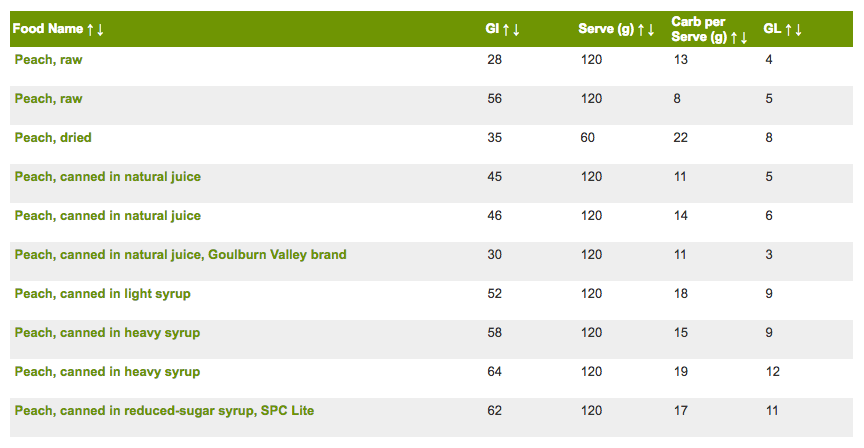
Have a play around with the University of Sydney’s FoodSearch feature to see the GI rating for various foods: http://www.glycemicindex.com/foodSearch.php
A word about fruit
Some people write off fruit as detrimental to our health because it contains sugar.
This concern is valid – the effect sugar has on our body can be dangerous. But the sugar found in fruit, called fructose, has a much different effect on the body’s health than processed or refined sugar.
Processed sugar (sucrose) is most commonly used to sweeten cookies, cakes, crackers, soft drinks, and other foods with little nutritional value. It’s metabolized quickly in the body and causes the blood sugar to spike.
However, the fibers contained in fruit and vegetables allow them to act more like complex carbs, taking longer to digest and providing us with sustained energy.
Fruit is great to consume before or after a workout, due to its natural sugars and the muscles’ ability to use that sugar for energy.
Plant Based Foods That Promote Muscle Recovery
Want to improve your recovery time? Eat more plants.
It’s true! During intense exercise, our bodies lose vitamins and minerals, and it’s important to replenish these to get back to full health.
As mentioned in our Ultimate Guide to Going Vegan, you’ll absorb a huge variety of nutrients by eating a wide assortment of plant foods. Here are some of the best plant foods that help recover after a fierce workout:
-
Amaranth – more protein than quinoa!
-
Nuts – almonds, cashews, walnuts
-
Lentils – 18g of protein in one cup
-
Oats
-
Avocados
-
Chickpeas
Read on to find out about bulking, cutting, and more specific bodybuilding techniques.
All About Supplementation
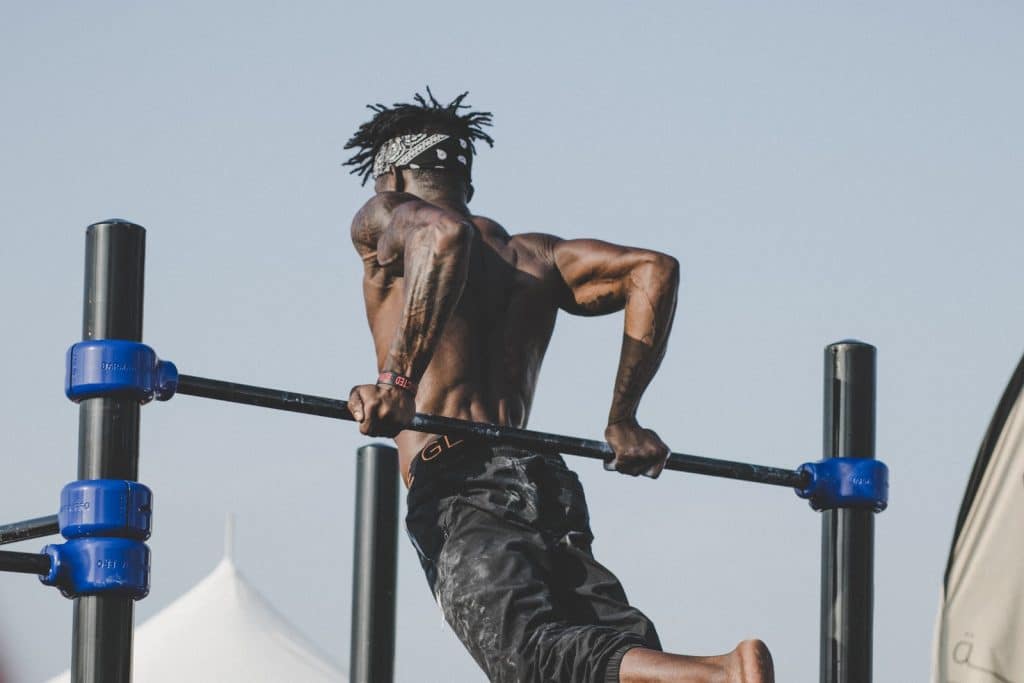
You’ve likely seen or heard about protein powders, but may not know what to do with them or how to use them best.
While it’s possible to build your body without the aid of a protein powder, it can be much more difficult to get the right amount of nutrients solely from food.
The best part of protein powder is the convenience, but there are a few reasons to be thoughtful and selective when choosing a powder.
-
Many protein powders use artificial ingredients.
-
Protein powders are notorious for being unnecessarily expensive.
-
Some powders are heated to the point that they denature the proteins (and remove the benefit of consumption).
We recommend these four clean, vegan protein powders that won’t break the bank:
Here are five other supplements to consider (of the vegan variety, of course!):
BCAAs
Our body can produce 12 of the 21 amino acids required to synthesize protein. The rest, we must get from food or supplements.
BCAAs (Branched-Chain Amino Acids) are one of the most popular supplements to any bodybuilder’s regimen.
As it makes up 35% of our muscle mass, protein really is the foundation of muscle. And the amino acids within the protein carry out important roles within the body, aiding in muscle recovery, ensuring hormones work correctly, and helping to carry oxygen through the body.
BCAAs are especially useful during intense workouts. When exercising hard, the body expends itself of amino acids (namely L-Alanine). It’s a good protocol to have extra BCAAs as a backup for when these are depleted, and the experts say there’s little harm in ingesting extra.
Creatine
We’ve established that there’s no problem in getting our protein as a vegan. But there’s another supplement that can greatly enhance strength training, endurance, and bodybuilding: creatine.
Some of the best benefits of creatine include increased strength, endurance, and even cognitive abilities. See the details of these benefits and more in this post by Athlegan.
The body uses creatine to replenish its supply of endogenous ATP (adenosine triphosphate), the type of energy used in high-intensity situations. And the more energy the muscles store, the better and more consistently they can perform.
Most creatine supplements are synthetic and 100% vegan. However, always check the label and contact the company if it’s not clear or if you’re not sure.
Flax oil
Flax oil is recommended for bodybuilders because it triggers fat-burning and promotes the body’s metabolism.
In addition, flax will provide an excellent source of Omega-3 fatty acids, fiber, and an extra boost of protein.
DHA
DHA is a type of Omega-3 fatty acid and helps to ensure that our heart, eyes, and brain are functioning at their best. It’s also known for protecting the body by lowering the risk of heart disease.
This helps when bodybuilding due to the raised heart rate that accompanies exercise and heavy lifting. Some symptoms of DHA deficiency include poor memory, poor circulation, dry skin, and fatigue.
In addition to your regular diet, the best way to get the proper quantity of DHA is to take a softgel or capsule.
Multivitamin
Choosing a plant-based multivitamin can serve as a great way to receive many benefits at once. This is especially important in muscle building, as some nutrients can be lowered or depleted during the process.
Many multivitamins are made from synthetic or artificial ingredients and lack the living enzymes necessary to activate the health-producing factors within the body.
However, a multivitamin can be the best way to receive your daily dose of the above vitamins if you’re not receiving them naturally. When choosing a vitamin, opt for a natural one with ingredients sourced completely from whole foods.
Tip: ensure that any supplement you consider does not include the ingredient labeled “gelatin:” this is created with animal ligaments, tendons, skin, and bones.
Want to learn more about supplementing as a vegan?We wrote an in-depth post all about it.
All About Macros
In terms of bodybuilding, macronutrients are the types of foods required in high amounts in the diet. These include protein, carbohydrates, and fats.

But how do you know how much you actually need?
The optimal macronutrient (or “macro”) requirement will be different depending on your goals and your current state.
For example, someone with high body fat may put a focus on consuming more protein and carbs, or someone trying to gain weight may increase the good fats and protein they consume.
A basic rule for protein
For protein, the USDA’s recommended daily intake is 46 grams for women and 56 grams for men. (source).
The Protein Myth
How much is too much?
Many people used to think that you could never get too much protein and that it was fine to eat as much as possible when bodybuilding.
One recommendation was that one should eat one gram of protein for each pound they weigh.
However, as demonstrated in this article by Physicians Committee for Responsible Medicine, someone can, in fact, consume too much protein…and to great danger. Excess protein is linked to osteoporosis, kidney disease, some cancers, and more.
But we’re bodybuilding here. What about protein for athletes?
Also noted in the article is that athletes only need slightly more protein than others, as they’re usually burning more calories during the day.
See our All About Supplementation section above for links to our recommended protein powders.
“As long as one is eating a variety of plant foods in sufficient quantity to maintain one’s weight, the body gets plenty of protein.”
-The Physician’s Committee for Responsible Medicine
What Is Bulking?

What is bulking?
In bodybuilding, bulking means to eating more and training heavier in order to gain more muscle mass.
Here are several vegan foods perfect for bulking up:
-
Lentils
-
Legumes
-
Tofu
-
Rice
-
Oatmeal
-
Fruit Smoothies
-
Almonds
-
Protein powder
-
Smoothies with bananas are great
And here are some of our favorite ways to enjoy those delicious foods!
Simple Recipes For Bulking
-
Ultimate Oats Oatmeal with a scoop of protein, mixed berries, and a banana
-
Mad Mexican Bowl Two cups of brown rice, ½ cup of black beans, grilled vegetables, salsa, and avocado
-
The Power Smoothie One cup of kale, a handful of almonds, a banana, organic crunchy peanut butter, pea protein powder, and a cup of frozen berries
-
Peanut Butter Energy Balls Oats, coconut flakes, flax seeds, chia seeds, peanut butter, vanilla extract, and carob chips. Mix it all together with honey and prepare for the best snack you’ve ever had.
-
Leave a Comment